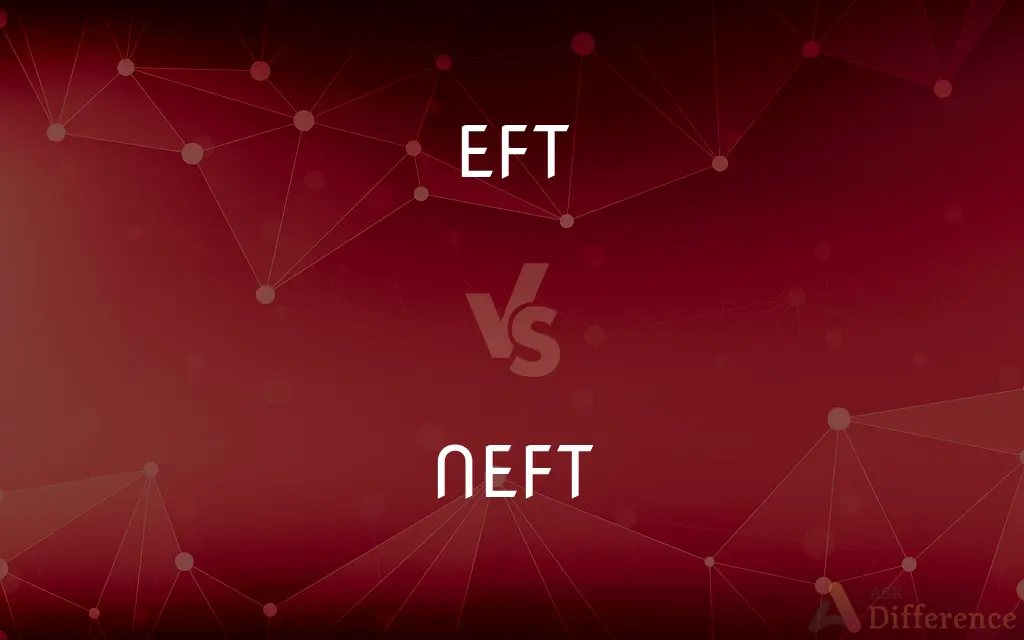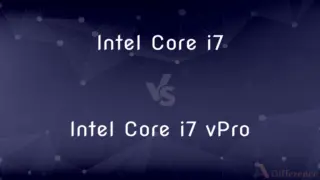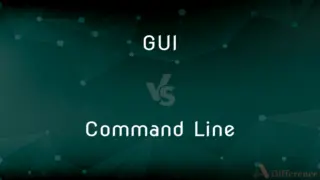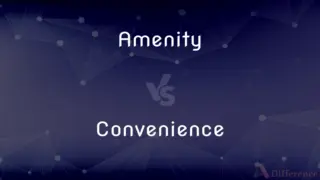EFT vs. NEFT — What's the Difference?
By Tayyaba Rehman — Published on January 1, 2024
EFT stands for Electronic Funds Transfer, a broad term for transferring money electronically. NEFT is National Electronic Funds Transfer, an India-specific system for interbank transfers.

Difference Between EFT and NEFT
Table of Contents
ADVERTISEMENT
Key Differences
EFT (Electronic Funds Transfer) refers to the electronic transfer of funds between bank accounts, regardless of the method used. NEFT (National Electronic Funds Transfer) is a specific type of EFT system in India, designed to facilitate one-to-one fund transfers. Through EFT, the user can perform various types of fund transfers, such as wire transfers, ACH, and direct deposit. However, NEFT exclusively deals with interbank transactions within India and operates in hourly batches.
EFT can be a global concept, understood and used in many countries to denote any electronic movement of money. NEFT, on the other hand, is India-centric and regulated by the Reserve Bank of India (RBI). For an EFT to occur, the exact mechanism and rules can differ based on the country or the system in use. NEFT, however, has specific guidelines, timeframes, and charges established by RBI.
EFT systems can sometimes offer instantaneous transfers, especially within the same bank or institution. NEFT, while faster than some methods like checks or demand drafts, is not instantaneous, as it processes transactions in batches during designated hours. EFT might encompass a wider range of transaction types and systems. In contrast, NEFT is solely focused on facilitating individual bank-to-bank transactions within the geographical boundaries of India.
Comparison Chart
Definition
Electronic transfer of funds
Indian system for interbank electronic transfer
Geographical Scope
Global
India-specific
ADVERTISEMENT
Regulation
Varies by country/system
Regulated by the Reserve Bank of India
Transfer Method
Can be instantaneous or batched
Operates in hourly batches
Usage
General term for electronic transfers
Specific to individual bank-to-bank transactions
Compare with Definitions
EFT
A digital method to process transactions without physical checks or cash.
Companies prefer EFT for payroll because it's efficient and quick.
NEFT
An Indian interbank electronic fund transfer system.
I used NEFT to send money to my cousin's bank account in Delhi.
EFT
A system encompassing various electronic transactions, including direct deposits and wire transfers.
My employer uses EFT to deposit my salary directly into my bank account.
NEFT
An electronic method in India facilitating one-to-one bank transactions.
With NEFT, I can ensure the exact amount reaches the recipient's bank.
EFT
An umbrella term for technologies facilitating electronic payments.
Thanks to EFT, I can pay my bills online without mailing a check.
NEFT
An Indian digital alternative to physical checks for interbank transfers.
Instead of sending a check, I'll just do a NEFT transfer to your account.
EFT
An electronic movement of money between bank accounts.
With EFT, I can easily transfer money to my friend's account overseas.
NEFT
A system regulated by the Reserve Bank of India for transferring money between banks.
For NEFT transfers, there are specific operating hours set by RBI.
EFT
A modern way to manage and move money without manual intervention.
EFT has made managing finances for businesses a lot simpler.
NEFT
A batch-processing system for electronic fund transfers in India.
NEFT transactions are processed in hourly batches, so it's not real-time.
EFT
A newt in its juvenile terrestrial stage, especially the reddish-orange form of the North American species Notophthalmus viridescens.
EFT
A newt, especially the European smooth newt (Lissotriton vulgaris, syn. Triturus punctatus).
EFT
(obsolete) Again; afterwards
EFT
A European lizard of the genus Seps.
EFT
Again; afterwards; soon; quickly.
I wold never eft comen into the snare.
EFT
A newt in its terrestrial stage of development
Common Curiosities
Is NEFT exclusive to India?
Yes, NEFT is an India-specific system regulated by the Reserve Bank of India.
Are all EFTs instantaneous?
No, the speed of EFTs can vary, but some methods like wire transfers can be instantaneous.
Can EFT be used internationally?
Yes, EFT encompasses various international electronic transfer methods.
Can I consider wire transfers as EFT?
Yes, wire transfers are a form of EFT.
What is EFT?
EFT stands for Electronic Funds Transfer, denoting any electronic movement of money between bank accounts.
How is NEFT different from EFT?
NEFT is a specific type of EFT system in India used for interbank transfers.
Do both EFT and NEFT require internet access?
Generally, both processes are electronic, so internet access is commonly used, but specific methods might differ.
How fast is a NEFT transfer?
NEFT operates in hourly batches during designated hours, so it's not real-time.
Is there a limit on the amount transferred via NEFT?
The Reserve Bank of India sets limits and guidelines for NEFT transactions.
Is EFT safe?
EFT is generally considered safe, but it's essential to follow best practices for online financial security.
How secure is NEFT?
NEFT, being regulated by RBI, has robust security measures in place.
Who regulates NEFT?
NEFT is regulated by the Reserve Bank of India.
Is there a charge for NEFT transactions?
Fees for NEFT vary based on the bank and the transferred amount, as set by RBI guidelines.
How do I know if my bank supports NEFT?
Most banks in India support NEFT. You can check with your bank or on the RBI website for a list of participating banks.
Can EFT be used for recurring payments?
Yes, EFT can be set up for recurring transactions like bill payments.
Share Your Discovery

Previous Comparison
Polyester vs. Viscose
Next Comparison
Family Room vs. Living RoomAuthor Spotlight
Written by
Tayyaba RehmanTayyaba Rehman is a distinguished writer, currently serving as a primary contributor to askdifference.com. As a researcher in semantics and etymology, Tayyaba's passion for the complexity of languages and their distinctions has found a perfect home on the platform. Tayyaba delves into the intricacies of language, distinguishing between commonly confused words and phrases, thereby providing clarity for readers worldwide.
















































